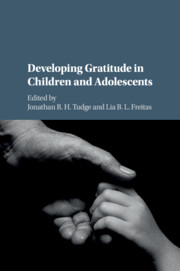Book contents
- Developing Gratitude in Children and Adolescents
- Developing Gratitude in Children and Adolescents
- Copyright page
- Dedication
- Contents
- Figures
- Tables
- Contributors
- Acknowledgments
- 1 Developing Gratitude
- Part I Setting the Scene
- Part II Gratitude, Developing
- Part III Developing Gratitude
- 9 Relations between Parents’ and Children's Gratitude
- 10 Parent Socialization of Children's Gratitude
- 11 Children's and Parents’ Understanding of Gratitude
- 12 Developing Gratitude as a Practice for Teachers
- 13 Teaching Gratitude through Literature
- Index
- References
10 - Parent Socialization of Children's Gratitude
from Part III - Developing Gratitude
Published online by Cambridge University Press: 07 December 2017
- Developing Gratitude in Children and Adolescents
- Developing Gratitude in Children and Adolescents
- Copyright page
- Dedication
- Contents
- Figures
- Tables
- Contributors
- Acknowledgments
- 1 Developing Gratitude
- Part I Setting the Scene
- Part II Gratitude, Developing
- Part III Developing Gratitude
- 9 Relations between Parents’ and Children's Gratitude
- 10 Parent Socialization of Children's Gratitude
- 11 Children's and Parents’ Understanding of Gratitude
- 12 Developing Gratitude as a Practice for Teachers
- 13 Teaching Gratitude through Literature
- Index
- References
- Type
- Chapter
- Information
- Developing Gratitude in Children and Adolescents , pp. 199 - 219Publisher: Cambridge University PressPrint publication year: 2017
References
- 6
- Cited by



